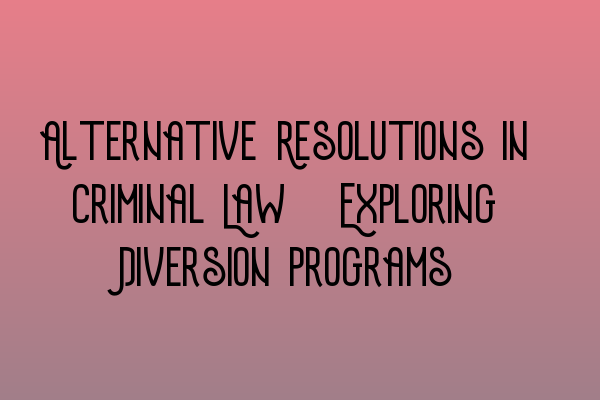Alternative Resolutions in Criminal Law: Exploring Diversion Programs
When it comes to criminal law, the traditional approach has often been focused on punishment and retribution. However, there is an increasing recognition of the benefits of alternative resolutions in certain cases. In this blog post, we will explore diversion programs, a form of alternative resolution that aims to divert individuals away from the criminal justice system and provide them with the necessary support and rehabilitation.
What are Diversion Programs?
Diversion programs are initiatives designed to provide eligible offenders, particularly first-time or non-violent offenders, with an opportunity to address the underlying causes of their criminal behavior and avoid formal charges or convictions. These programs offer individuals a chance to participate in rehabilitative services, counseling, education, or community service, instead of facing traditional criminal proceedings.
By offering diversion programs, the criminal justice system aims to prevent the potential negative consequences associated with a conviction, such as a permanent criminal record, incarceration, or significant fines. The focus is on addressing the root causes of criminal behavior, reducing the likelihood of reoffending, and promoting overall community well-being.
Benefits of Diversion Programs
Diversion programs provide several key benefits both to individuals involved in the criminal justice system and to the wider community. Some of the main advantages include:
- Reduced recidivism rates: Diversion programs allow individuals to receive the support and resources they need to address the underlying issues contributing to their criminal behavior. By addressing these issues, diversion programs have been shown to significantly decrease the likelihood of reoffending.
- Cost-effectiveness: Diversion programs are often more cost-effective than traditional criminal proceedings. By providing individuals with the opportunity to receive rehabilitative services, rather than costly court processes and incarceration, diversion programs can lead to significant cost savings for the criminal justice system.
- Community engagement: Diversion programs actively involve the community in the rehabilitation process. This engagement helps promote a sense of responsibility and accountability among offenders, while also fostering a stronger connection between communities and their justice system.
- Individualized approach: Diversion programs recognize that each person’s circumstances and needs are unique. By tailoring interventions and services to the individual, these programs can address the specific issues that contribute to criminal behavior and increase the chances of successful rehabilitation.
Types of Diversion Programs
Diversion programs can vary depending on jurisdiction and specific needs. Some common types of diversion programs include:
- Pre-charge diversion: This program diverts individuals from the court process before formal charges are laid. It typically involves counseling or community service.
- Post-charge diversion: This program diverts individuals from court proceedings after charges have been laid but before trial or sentencing. It may involve participation in treatment programs or restorative justice processes.
- Drug diversion: This program focuses specifically on individuals involved in drug-related offenses and offers treatment, counseling, and support as an alternative to criminal charges.
- Mental health diversion: This program aims to divert individuals with mental health issues from the criminal justice system into appropriate treatment and support services.
It is essential to note that diversion programs are not suitable for all cases and all offenders. Some offenses may be deemed too serious or too detrimental to public safety for diversion to be considered a viable option. Each case is thoroughly assessed to determine eligibility for participation.
Conclusion
Diversion programs offer an alternative resolution to certain offenders who qualify for participation. By prioritizing rehabilitation, support, and addressing the underlying causes of criminal behavior, these programs can promote positive changes and reduce the likelihood of reoffending. It is crucial for criminal justice systems to continue exploring and developing alternative resolutions like diversion programs to foster a more rehabilitative and community-centered approach to criminal law.
